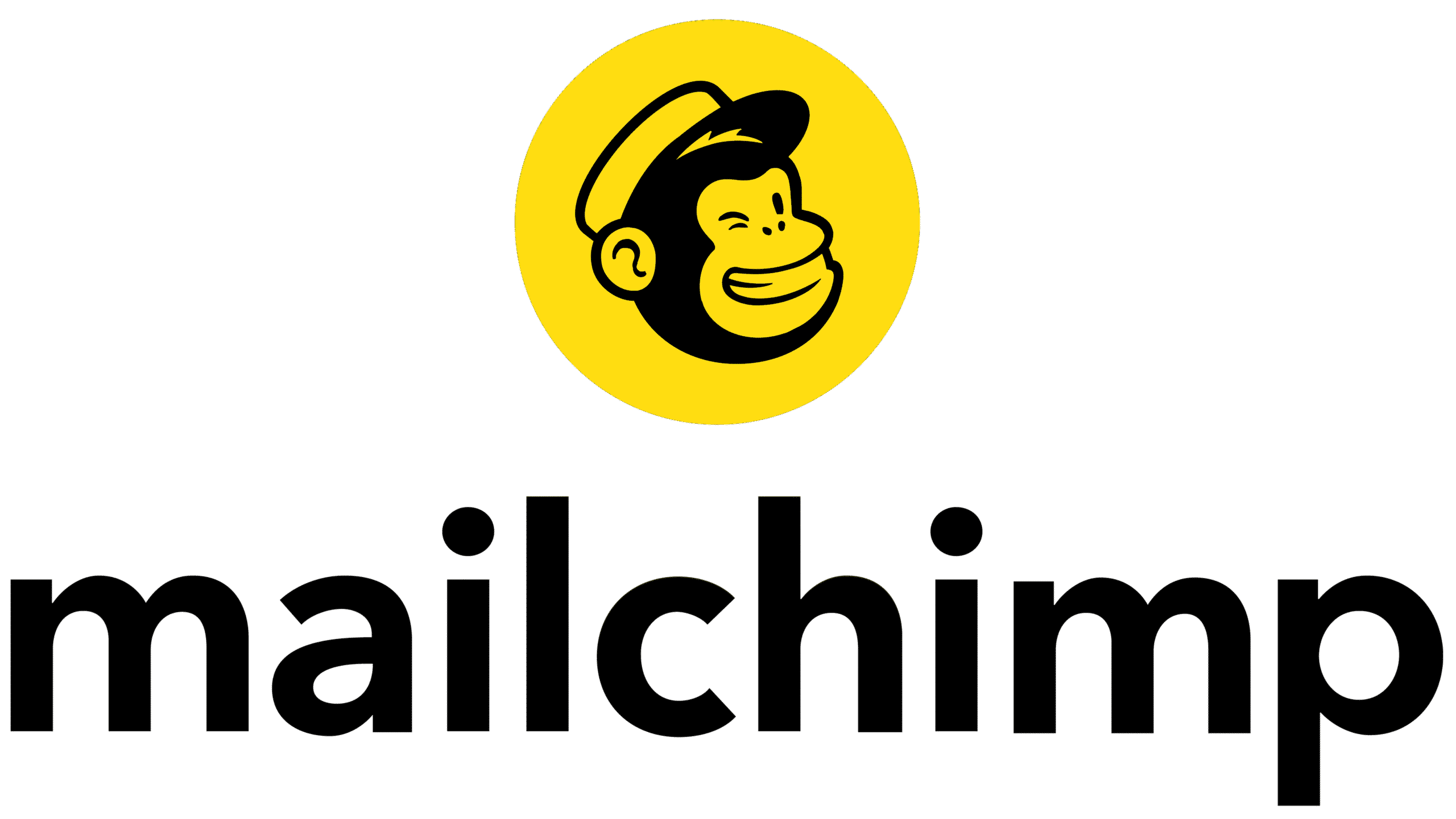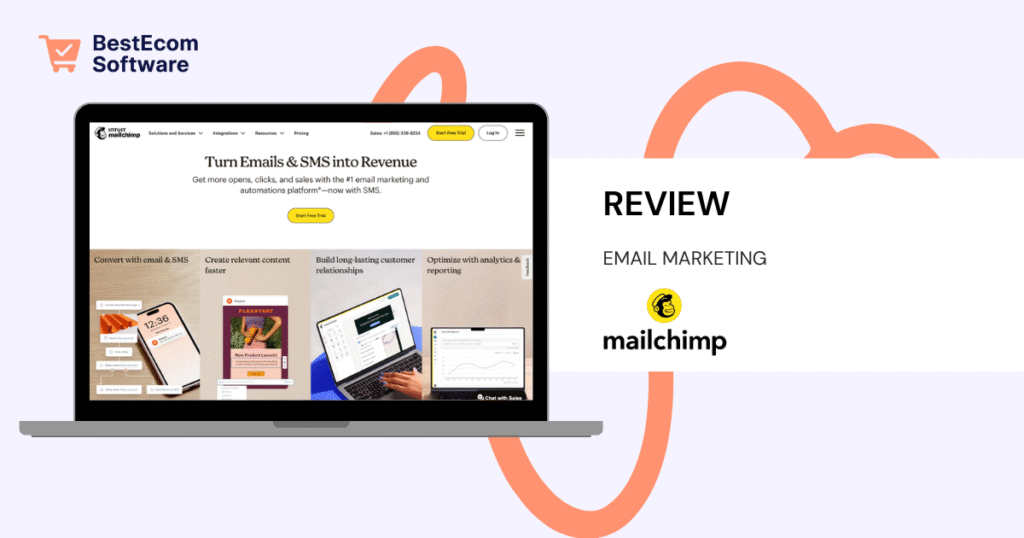
Starting From
- Free: Up to 500 contacts, 1,000 emails/month with Mailchimp branding
- Essentials: Starts at $13/month for 500 contacts
- Standard: Starts at $20/month for 500 contacts
- Premium: Starts at $350/month for enterprise‑level needs
PROS
- Generous free tier for beginners with basic automation & templates
- Drag‑and‑drop email builder plus Creative Assistant AI tools
- Robust integration network, ecommerce and behavioral automations
- Advanced segmentation, A/B and multivariate testing on paid tiers
CONS
- Free plan limits: branding, capped sends, no automation
- Pricing scales steeply with contact list growth; cleaned/unsubscribed contacts still billed
- Live support only for paid tiers—phone support reserved for Premium
- Navigation and UI can feel cluttered and unintuitive
Mailchimp Review
Heads up: This Mailchimp review contains affiliate links, which means if you click and buy, I may earn a small commission at no extra cost to you. I only recommend tools I’d pitch to a friend and believe in.
Mailchimp is one of the most recognizable names in email marketing. Originally founded in 2001 as a simple email service provider, it’s evolved into a full-fledged marketing platform now owned by Intuit. Whether you’re a solopreneur, a growing ecommerce brand, or a large enterprise team, Mailchimp likely has a plan and feature set to fit your needs—though how much value you get out of it depends a lot on your plan, your contact size, and how deeply you want to automate and personalize your campaigns.
Table of Contents
1. Features & Capabilities
Mailchimp’s core offering is its email marketing suite, which includes a versatile drag-and-drop builder, 130+ email templates, and its Creative Assistant—an AI-powered tool that can generate headlines, suggest color palettes, and even write basic email copy. It’s perfect for marketers who want to save time while still producing polished content. Templates are responsive, customizable, and support dynamic blocks, countdown timers, surveys, and product carousels.
The automation capabilities, branded as “Customer Journeys,” range from basic autoresponders to complex multi-step workflows triggered by behavior (like cart abandonment), list changes, or ecommerce events. On the Standard and Premium tiers, you can insert delays, conditional splits, and even trigger different content depending on customer purchase behavior.
Segmentation is another strong point. With predictive demographics, customer value modeling, and behavior-based rules, marketers can laser-target specific audience subsets. For example, you can target people who opened an email in the last 30 days, spent over $50, and haven’t made a purchase in 90 days. These filters become more powerful on the higher tiers.
Mailchimp also includes ecommerce tools like product recommendations, purchase-based automation, and integrations with Shopify, WooCommerce, BigCommerce, Magento, and Square. You can use dynamic product blocks in emails, track revenue from campaigns, and create repeat buyer flows without leaving the platform.
Forms and landing pages are built-in. You can spin up custom forms that embed into your website, appear as pop-ups, or get hosted on their own landing pages. You’ll need a paid plan to remove Mailchimp branding and access the full template gallery, but even the free options are serviceable.
Analytics and reporting get more robust as you upgrade. Standard and Premium users gain access to comparative reports, funnel analysis, and send time optimization. Every user can see open rates, click maps, and bounce stats, but deeper insights into revenue performance and customer lifecycle require higher tiers.
2. Pricing & Value
Mailchimp’s pricing is both tiered and usage-based. You pay based on your contact count and which plan you’re on. Here’s the breakdown:
Free
$0/month
- Up to 500 contacts
- 1,000 emails/month
- Single-step automation
Essentials
From $13/month
- A/B testing
- Email scheduling
- Email & chat support
Standard
From $20/month
- Behavioral automation
- Send time optimization
- Predictive segmentation
Premium
From $350/month
- Unlimited audiences
- Phone support
- Multivariate testing
The free plan is great for trying out the platform, but it comes with limitations: daily send caps, branded footers, and no full automation capabilities. Essentials gives you more design options and removes branding, while Standard adds smarter automation and audience insights. Premium is built for teams needing robust segmentation, testing, and deliverability controls. One caveat: Mailchimp counts all contacts in your list—subscribed or not—toward your billing quota, which can cause sticker shock if you don’t prune your list regularly.
3. Ease of Use & Onboarding
Mailchimp’s UI is clean, modern, and packed with helpful onboarding guides. Setup wizards walk you through importing your contacts, authenticating your domain, and launching your first campaign. Templates load quickly, and the email builder is intuitive—even for people with no design experience.
However, once you get into the weeds of Customer Journeys, things get more complex. Branching logic, multiple triggers, and ecommerce rules are powerful, but navigating them isn’t always smooth. It’s still more user-friendly than most platforms in its class, but beginners might feel overwhelmed when trying to scale automations or troubleshoot a failed send.
4. Case Studies & Reputation
Mailchimp is trusted by millions of users across industries, including nonprofits, DTC brands, coaches, and SaaS startups. Case studies feature brands increasing repeat purchases, improving engagement by 40% through smart segmentation, and recovering abandoned carts with multi-step flows.
Customer reviews on G2 and TrustRadius highlight the platform’s reliability, brand recognition, and versatility. Common complaints include the billing structure, slow support for lower tiers, and occasional bugs in the visual automation editor. Nonetheless, Mailchimp remains one of the top-rated tools in the email marketing space.
5. Customer Support & Reliability
Support is tiered based on your plan. Free users get 30 days of email-only help, while Essentials and above include 24/7 chat. Premium users get phone support and a designated account rep. Mailchimp’s help center is extensive, with tutorials, how-to articles, webinars, and community forums that answer most common issues.
Reliability is excellent—uptime is consistently high, and deliverability rates hover above industry average. SPF/DKIM authentication, domain verification, and sender reputation tools help keep your emails out of spam folders. Paid plans also include send time optimization and audience retargeting to boost campaign results.
6. Summary & Final Rating
Pros
Cons
Final Rating: ★★★★☆ (3.9/5)
Mailchimp is a go-to option for anyone looking to blend simplicity with power. It scales from solopreneurs to enterprise teams and packs in features without overwhelming you at the start. While it’s not the cheapest or most advanced platform out there, it balances functionality, design, and ease of use extremely well. If you’re starting your email marketing journey or want a trusted, all-in-one tool with growth potential—Mailchimp is hard to beat.
